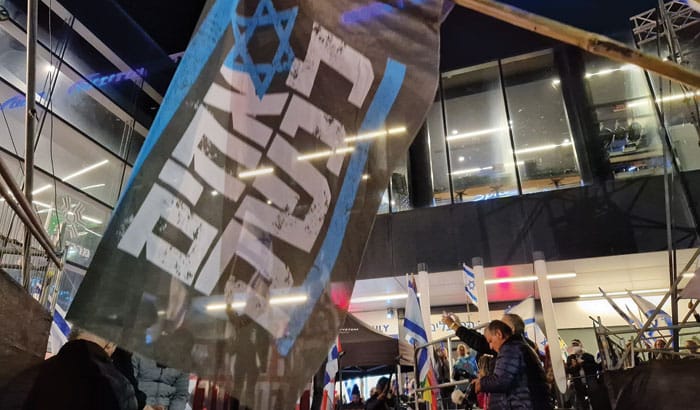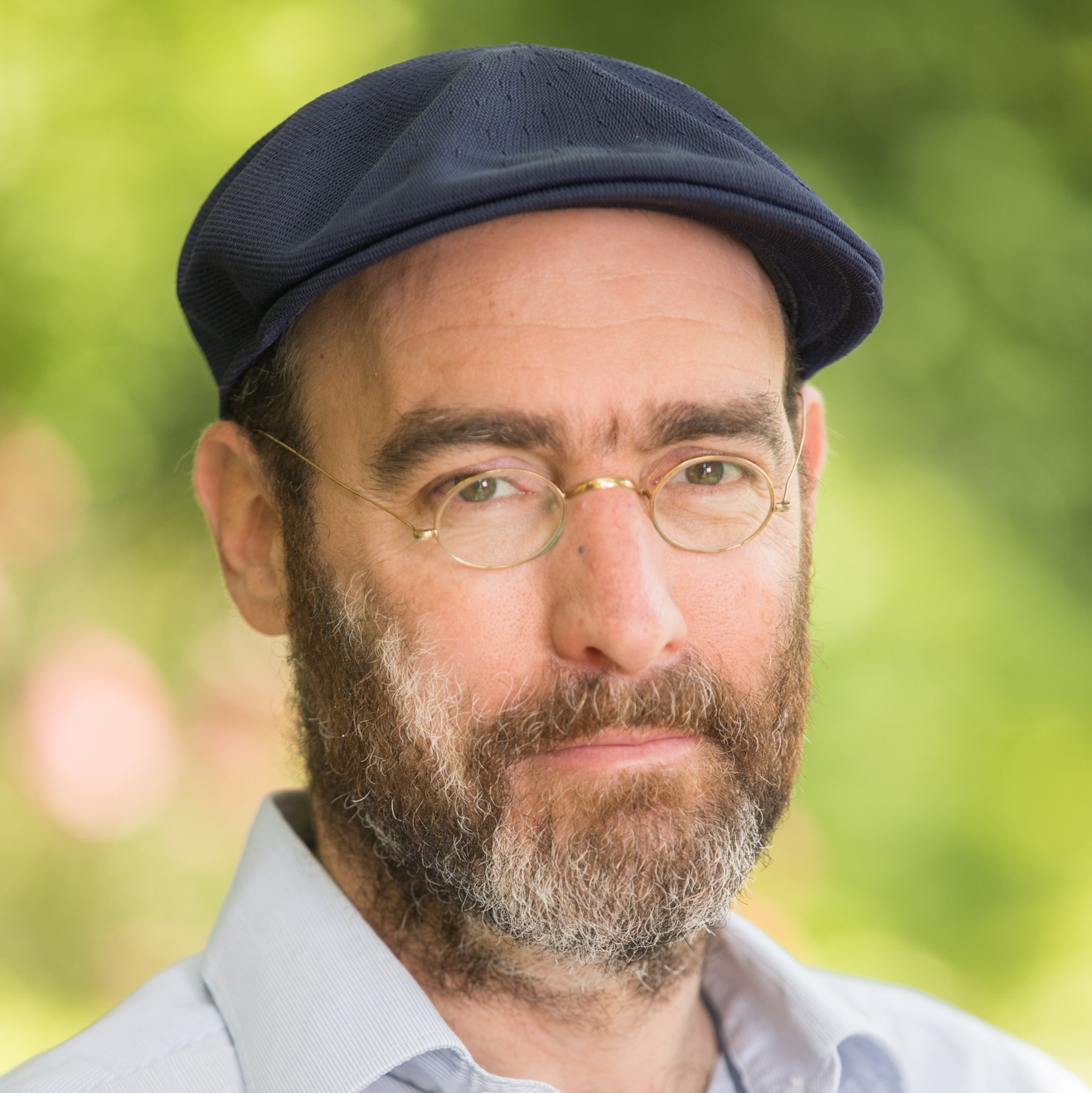 The “Brothers in Arms” organization during a demonstration against judicial reform, March 23, 2023 (Photo by Hanay/ CC BY-SA 3.0)
The “Brothers in Arms” organization during a demonstration against judicial reform, March 23, 2023 (Photo by Hanay/ CC BY-SA 3.0) The feelings of unity that Israelis shared after the barbaric massacre of Oct. 7 are slowly ebbing. Now the tensions and disputes of the last year are returning to the fore, parallel to the ongoing war.
Netanyahu seems to be in constant campaign mode, trying to deflect blame for his years of empowering Hamas, and what we in Israel call his “poison machine” — meaning the network of hired professionals, activists and bots manufacturing nonstop propaganda — has turned its rancor toward the NGO Brothers in Arms.
Brothers in Arms was established as a civic resistance group to the current government’s attempt at judicial overhaul. It was founded mostly by army veterans, secular centrist Zionists who took action against the unraveling of Israel’s republican ethos and liberal public sphere. They were arguably the largest, most organized and efficient group in the coalition of organizations resisting Netanyahu’s government, taking part in the protests and leading other ventures in the ongoing effort to oppose its plans.
The beginning of the war brought a swift shift for them. The organization turned into an auxiliary support group for the IDF, operating an enormous assemblage of warehouses and courier services aimed at supplying equipment missing and needed by the soldiers and helping civilians who have left homes near the war zone. They have done all this with their signature motivation and organizational skills.
Over the past few weeks, in response to Netanyahu’s blatant concern about his own political future, they have again begun to criticize him. That’s when the “poison machine” resumed taking aim at them.
But it’s not only the government’s usual mouthpieces doing it. Brothers in Arms have been the target of sustained attacks by broader circles in the Israeli right, and it begs the question: Why? When the Israeli government is so dysfunctional, when acting ministers cause immense damage to the war effort by blurting out fantasies about resettling Gaza with Jews or, on the contrary, wiping it out with an atom bomb — what could be so annoying about an organization of Zionist patriots who have built the largest and most effective civilian support system for the IDF ever, who are helping citizens who have been dislocated, not to mention literally saving lives, while, yes, opposing the current government and demanding it be replaced? What’s the big deal?
I propose that their effectiveness is exactly what makes them a big deal: That they embody a highly organized, efficient and motivated secular, liberal civic movement such as has not been seen in Israel in decades.
In this it is a direct competitor to groups on the religious right, which are also organized, effective and highly motivated, which are changing the geography of Israel in Judaea and Samaria, which send “Torah groups” to live in secular neighborhoods, which employ pressure and lobby groups in the Knesset – and which used to be the only team to appear for the match.
Flashback 50 years. After the Yom Kippur War, two large civic movements arose: Gush Emunim and Peace Now. Both rose from the trauma of the Arab nations’ surprise attack, and both sought to rebuild Israel.
Gush Emunim ran to the hills of Samaria, established settlements and changed the face of the country forever. Peace Now pushed for the peace treaty with Egypt, then for the Oslo Accords, and changed Israel as well.
But the collapse of the Israeli left since the breakdown of the peace process with the Palestinians has also broken Peace Now. It has long ceased to be the great movement it once was. In its place, many rights-centered organizations arose, but since the ‘90s a mass civic movement in the center or the left of Israel’s political field was nowhere to be found.
Gush Emunim is also gone, but the masses and the motivation are still there, and are channeled to the service of small movements, well financed by the government, which work just as tirelessly to change the face of the country.
The religious right became used to the fact that many Israelis — at the political center, left and mainstream, the secular population, the urban populace, the broad middle class — did not like what they were doing, but assumed such individuals preferred continuing with their lives to actively opposing them. Secular bourgeois Israelis are weak, nihilistic, self-centered hedonists, are they not?
Brothers in Arms is the first civic movement in decades to show the same determination the religious right organizations have — from the other direction.
Brothers in Arms is the first civic movement in decades to show the same determination the religious right organizations have — from the other direction. They are incredibly organized, thorough and efficient as only military personnel know how to be, motivated, and understand — as the other side realized a long time ago — that the struggle is over the essence of the country, its democracy and even its very existence.
This is the reason they are attacked so vehemently. Their opponents will do everything they can so that they will be the only force left on the civic stage after the war, shaping the country anew as Gush Emunim and Peace Now did.
Brothers in Arms fight not for certain political solutions to the Israeli-Arab conflict, as did Peace Now, but for the liberal and democratic framework of the country itself. They represent an ethos of republican service and proficiency in the face of the disintegration of the state into quarreling tribes and the politics of pressure groups and partisanship. They rise against the legitimization of corruption and the celebration of unprofessionalism, and of course protest the attempt by the current government to crush the separation of powers in Israel. Opposing all these clearly threatens the forces that attack them.
There is no doubt that after the war Israel will be brimming with various enterprises attempting to rejuvenate and reinvigorate Zionism in Israel by setting ambitious social goals and projects. There certainly will be such initiatives from the religious right, just as Gush Emunim appeared after the Yom Kippur War. Thankfully, there will also be such endeavors from the center and the left, of which Brothers in Arms will play a prominent role.
We can hope that they and others make an opportunity of this crisis, an opening to use the strengthened bond between the people and to the state to push towards a constructive, republican and liberal nationalism, presenting a vision of humanistic, prophetic Judaism as part of building a model society — an aspiration which was always part of the Zionist movement.
Dr. Persico is a Research Fellow at the Shalom Hartman Institute and a Rubinstein Fellow at Reichman University























 More news and opinions than at a Shabbat dinner, right in your inbox.
More news and opinions than at a Shabbat dinner, right in your inbox.